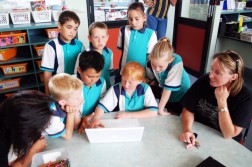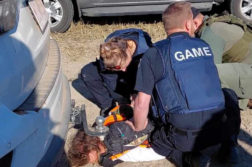My eight-year-old son gloated last week that he only had to be at school for six and a half hours a day. "It’s over before you know it," he said. By comparison, my working day is, on average, nine hours long and his sister is interned at creche for that entire time. Clearly punctuated into four and five compartments each day, his 27-and-a-half-hour working week seems blissful to him.
This got me thinking about the time that schools and teachers have to teach their students everything on the curriculum.
In light of the development of a common Australian curriculum, I think it is time to contemplate just how much we expect students to learn — and teachers to teach — within a typical school week.
The new Draft Curriculum will be trialled in selected schools from 2011 and will cover the four main areas of English, Maths, Science and History. The second stage of the trial will stretch to Geography, Languages Other Than English and the Arts and will be rolled out from 2012.
The initial reaction to the draft curriculum has been relatively calm. Not surprisingly some stakeholders have scrutinised the document and found that their particular interest area has been short-changed. The Asia Education Foundation, for example, has criticised the architects of the curriculum for their failure to promote "Asia literacy" in the study of history. On the other hand, shadow education minister Christopher Pyne has bemoaned the over-emphasis on Indigenous and Asian history — and the neglect of the Magna Carta. These criticisms aside, it’s clear that most teachers and parents are in favour of a national curriculum.
What has become apparent, however, is that the amount of content in the draft curriculum is just too voluminous, as I discussed in newmatilda.com last month.
The Year 10 course, for example, expects students to cover, in depth, World War I and every major event since, in just 80 hours of teaching time for the year. And in Science, the curriculum attempts to cover some content, such as plate tectonics, that some argue should remain within the realm of Geography.
Time allocations are yet to be finalised as it has become quite clear that each state and territory will have the final say as to the number of hours each subject will occupy on the timetable. Already, the Australian Curriculum, Assessment and Reporting Authority (ACARA), the body responsible for the draft, has admitted that the sheer volume of content may have to be revised.
There are some difficult decisions ahead for education bodies in the states and territories. In the 27 or so hours per week that my son, and all other Australian schoolkids, sit in class, teachers are expected to cover the core subjects — as well as the peripheries associated with the curriculum.
Timetabling is not the greatest problem here. The core elements in this curriculum could be covered within the available time but it is the extent to which they can be covered that is the real issue. No one wants to see repeats of the fabled situation in which one Victorian school, grappling with the implementation of the Victorian Essential Learning Standards Framework, apparently timetabled a double lesson called "Think" for students to ensure that they were meeting the standard for "Thinking Processes".
And standards for "Thinking Processes" lead us to the next big challenge facing teachers. Students have never gone to school just to learn the curriculum, this much isn’t new. But new — and commendable — goals for learners have been articulated which put further pressure on the school week.
The Melbourne Declaration on Educational Goals for Young Australians [pdf]outlines educational aims for young people across Australia. It includes, but is not limited to, students becoming successful learners, confident and creative individuals and active and informed citizens — not only through the curriculum and from teachers but from parents and the wider community as well.
The declaration, not over-earnest in its aims, specifies that students should be "creative and productive users of technology", active and informed citizens aware of issues associated with civic duty, diversity of cultures, sustainability and Australia’s place within the Asia-Pacific region. This is all very well — but how on earth can teachers imbue students with these values in the 27 available hours each week — all the while covering the key subjects "in depth"?
Teacher training and professional development is part of the answer to this question.
Without adequate, ongoing, professional engagement, Australian teachers cannot be expected to be able to provide "world class" education for students. Teachers need not only ongoing professional learning related to their discipline but also to wider pedagogical research. If an individual teacher has little knowledge themselves about "financial literacy" or "sustainability", how are they ever going to be able to teach them in their own classrooms?
The same applies to the integration of certain technologies across the curriculum — teachers do not avert the use of technology to be recalcitrant, but because they simply lack the time to develop new class plans — and to learn about the technology themselves. All of these elements may be implied in a teaching program — but only if the teacher has had the opportunity to develop their own understanding in advance of the school bell ringing.
Another part of the solution rests with school management. Schools should be able to meaningfully plan for a rich curriculum — and some will need help to do so. Questions need to be asked about whether the leadership of a particular school understands the planning issues involved, and whether they have been able to keep up to date via professional training programs with recent developments.
When grappling with this question of just how much kids should be expected to learn, we also need to engage with prevailing attitudes and expectations of how learning happens and where it happens. With whom should the responsibility for a young person’s education ultimately lie? With their school teachers?
The Melbourne Declaration makes it clear that it is the "collective responsibility" of governments, parents and carers, families and the broader community to ensure that these aims are achieved. It’s not just teachers or schools or the "school sector".
This broader distribution of responsibility for learning should be neither an excuse nor a reprieve for teachers. What it is is a reminder that the brief school week has its limitations and while the broader community is happy to repeat aphorisms about quality being better than quantity, until the resources are available to put this into practice, school curricula will always be at risk of being too crowded.
Donate To New Matilda
New Matilda is a small, independent media outlet. We survive through reader contributions, and never losing a lawsuit. If you got something from this article, giving something back helps us to continue speaking truth to power. Every little bit counts.



